| Listing 1 - 10 of 57 | << page >> |
Sort by
|
Book
ISBN: 0801484103 9780801484100 Year: 1996 Publisher: Ithaca (N.Y.) : Cornell university press,
Abstract | Keywords | Export | Availability | Bookmark
 Loading...
Loading...Choose an application
- Reference Manager
- EndNote
- RefWorks (Direct export to RefWorks)
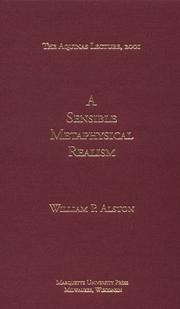
ISBN: 0874621682 9780874621686 Year: 2001 Volume: 2001 Publisher: Milwaukee Marquette university press
Abstract | Keywords | Export | Availability | Bookmark
 Loading...
Loading...Choose an application
- Reference Manager
- EndNote
- RefWorks (Direct export to RefWorks)
Metaphysics. --- Realism. --- Conceptualism --- Metaphysics --- Realism --- Empiricism --- Philosophy --- Universals (Philosophy) --- Dualism --- Idealism --- Materialism --- Nominalism --- Positivism --- Rationalism --- God --- Ontology --- Philosophy of mind
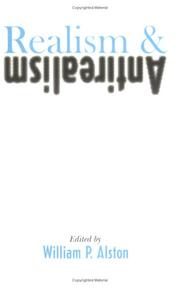
ISBN: 0801487900 Year: 2002 Publisher: Ithaca (N.Y.): Cornell university press
Abstract | Keywords | Export | Availability | Bookmark
 Loading...
Loading...Choose an application
- Reference Manager
- EndNote
- RefWorks (Direct export to RefWorks)
Realism. --- Realism --- Empiricism --- Philosophy --- Universals (Philosophy) --- Conceptualism --- Dualism --- Idealism --- Materialism --- Nominalism --- Positivism --- Rationalism
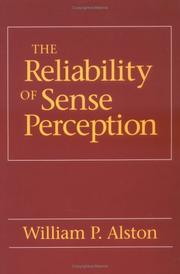
ISBN: 0801428629 Year: 1993 Publisher: Ithaca (N.Y.): Cornell university press
Abstract | Keywords | Export | Availability | Bookmark
 Loading...
Loading...Choose an application
- Reference Manager
- EndNote
- RefWorks (Direct export to RefWorks)
Belief and doubt --- Knowledge, Theory of --- Senses and sensation --- Sensation --- Sensory biology --- Sensory systems --- Neurophysiology --- Psychophysiology --- Perception --- Epistemology --- Theory of knowledge --- Philosophy --- Psychology --- Conviction --- Doubt --- Consciousness --- Credulity --- Emotions --- Religion --- Will --- Agnosticism --- Rationalism --- Skepticism --- Belief and doubt. --- Knowledge, Theory of. --- Senses and sensation.
Book
ISBN: 0801431875 1501720554 Year: 2018 Publisher: Ithaca, NY : Cornell University Press,
Abstract | Keywords | Export | Availability | Bookmark
 Loading...
Loading...Choose an application
- Reference Manager
- EndNote
- RefWorks (Direct export to RefWorks)
One of the most important Anglo-American philosophers of our time here joins the current philosophical debate about the nature of truth. William P. Alston formulates and defends a realist conception of truth, which he calls alethic realism (from "aletheia," Greek for truth). This idea holds that the truth value of a statement (belief or proposition) depends on whether what the statement is about is as the statement says it is. Michael Dummett and Hilary Putnam are two of the prominent and widely influential contemporary philosophers whose anti-realist ideas Alston attacks.
Realism. --- Truth. --- Knowledge, Theory of --- Realism --- Truth --- Epistemology --- Theory of knowledge --- Conviction --- Belief and doubt --- Philosophy --- Skepticism --- Certainty --- Necessity (Philosophy) --- Pragmatism --- Empiricism --- Universals (Philosophy) --- Conceptualism --- Dualism --- Idealism --- Materialism --- Nominalism --- Positivism --- Rationalism --- Psychology --- Knowledge, Theory of. --- Religious Studies. --- PHILOSOPHY / Epistemology. --- Alethic realism
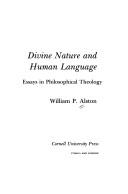
ISBN: 0801422582 Year: 1989 Publisher: Ithaca (N.Y.): Cornell university press
Abstract | Keywords | Export | Availability | Bookmark
 Loading...
Loading...Choose an application
- Reference Manager
- EndNote
- RefWorks (Direct export to RefWorks)
God (Christianity) --- Language and languages --- Philosophical theology --- Theology, Philosophical --- Foreign languages --- Languages --- Religious aspects&delete& --- Christianity --- Natural theology --- Philosophy and religion --- Theology, Doctrinal --- Anthropology --- Communication --- Ethnology --- Information theory --- Meaning (Psychology) --- Philology --- Linguistics --- Trinity --- Religious aspects --- Christianity and language
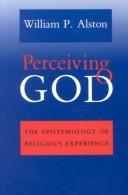
ISBN: 0801425972 Year: 1993 Publisher: Ithaca, N.Y. Cornell University Press
Abstract | Keywords | Export | Availability | Bookmark
 Loading...
Loading...Choose an application
- Reference Manager
- EndNote
- RefWorks (Direct export to RefWorks)
Experience (Religion) --- God (Christianity) --- Knowledge, Theory of (Religion) --- Epistemology, Religious --- Religious epistemology --- Religious knowledge, Theory of --- Religion --- Theology, Doctrinal --- Religious experience --- Psychology, Religious --- Knowableness of God --- Knowledge of God (Knowableness of God) --- Knowableness --- Philosophy --- Knowledge (Knowableness) --- Religious studies --- Christian spirituality --- Experience (Religion). --- Knowledge, Theory of (Religion). --- Knowableness.

ISBN: 0801471257 9780801471254 0801425972 9780801425974 Year: 2014 Publisher: Ithaca, NY
Abstract | Keywords | Export | Availability | Bookmark
 Loading...
Loading...Choose an application
- Reference Manager
- EndNote
- RefWorks (Direct export to RefWorks)
In Perceiving God, William P. Alston offers a clear and provocative account of the epistemology of religious experience. He argues that the "perception of God"-his term for direct experiential awareness of God-makes a major contribution to the grounds of religious belief. Surveying the variety of reported direct experiences of God among laypersons and famous mystics, Alston demonstrates that a person can be justified in holding certain beliefs about God on the basis of mystical experience. Through the perception that God is sustaining one in being, for example, one can justifiably believe that God is indeed sustaining one in being. Alston offers a detailed discussion of our grounds for taking sense perception and other sources of belief-including introspection, memory, and mystical experience-to be reliable and to confer justification. He then uses this epistemic framework to explain how our perceptual beliefs about God can be justified. Alston carefully addresses objections to his chief claims, including problems posed by non-Christian religious traditions. He also examines the way in which mystical perception fits into the larger picture of grounds for religious belief. Suggesting that religious experience, rather than being a purely subjective phenomenon, has real cognitive value, Perceiving God will spark intense debate and will be indispensable reading for those interested in philosophy of religion, epistemology, and philosophy of mind, as well as for theologians.
God --- Experience (Religion) --- Knowledge, Theory of (Religion) --- God (Christianity) --- Religion --- Philosophy & Religion --- Christianity --- Knowableness of God --- Knowledge of God (Knowableness of God) --- Epistemology, Religious --- Religious epistemology --- Religious knowledge, Theory of --- Theology, Doctrinal --- Religious experience --- Psychology, Religious --- Knowableness. --- Knowableness --- Knowledge (Knowableness) --- Philosophy
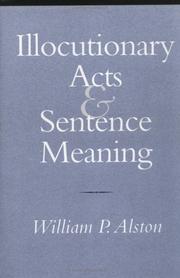
ISBN: 1501700413 1501700421 9781501700422 0801436699 9780801436697 Year: 2000 Publisher: Ithaca, NY
Abstract | Keywords | Export | Availability | Bookmark
 Loading...
Loading...Choose an application
- Reference Manager
- EndNote
- RefWorks (Direct export to RefWorks)
What is it for a sentence to have a certain meaning? This is the question that the distinguished analytic philosopher William P. Alston addresses in this major contribution to the philosophy of language. His answer focuses on the given sentence's potential to play the role that its speaker had in mind, what he terms the usability of the sentence to perform the illocutionary act intended by its speaker. Alston defines an illocutionary act as an act of saying something with a certain "content." He develops his account of what it is to perform such acts in terms of taking responsibility, in uttering a sentence, for the existence of certain conditions. In requesting someone to open a window, for example, the speaker takes responsibility for its being the case that the window is closed and that the speaker has an interest in its being opened. In Illocutionary Acts and Sentence Meaning, Alston expands upon this concept, creating a framework of five categories of illocutionary act and going on to argue that sentence meaning is fundamentally a matter of illocutionary act potential; that is, for a sentence to have a particular meaning is for it to be usable to perform illocutionary acts of a certain type. In providing detailed and explicit patterns of analysis for the whole range of illocutionary acts, Alston makes a unique contribution to the field of philosophy of language-one that is likely to generate debate for years to come.
Speech acts (Linguistics) --- Semantics. --- Grammar, Comparative and general --- Language and languages --- Sentences (Grammar) --- Formal semantics --- Semasiology --- Semiology (Semantics) --- Comparative linguistics --- Information theory --- Lexicology --- Meaning (Psychology) --- Illocutionary acts (Linguistics) --- Speech act theory (Linguistics) --- Speech events (Linguistics) --- Linguistics --- Speech --- Sentences. --- Sentences --- Philosophy --- Semantics --- Lexicology. Semantics --- Grammar --- Pragmatics --- Philosophy of language --- Philology
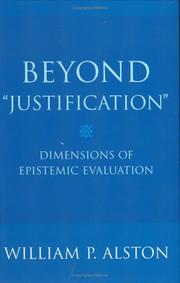
ISBN: 9781501720574 1501720570 0801442915 9780801442919 0801473322 9780801473326 Year: 2018 Publisher: Ithaca, NY
Abstract | Keywords | Export | Availability | Bookmark
 Loading...
Loading...Choose an application
- Reference Manager
- EndNote
- RefWorks (Direct export to RefWorks)
Much of the writing in Anglo-American epistemology in the twentieth century focused on the conditions for beliefs being "justified." In a book that seeks to shift the ground of debate within theory of knowledge, William P. Alston finds that the century-long search for a correct account of the nature and conditions of epistemic justification misses the point. Alston calls for that search to be suspended and for talk of epistemic justification to cease. He proposes instead an approach to the epistemology of belief that focuses on the evaluation of various "epistemic desiderata" that may be satisfied by beliefs.Alston finds that features of belief that are desirable for the goals of cognition include having an adequate basis, being formed in a reliable way, and coherence within bodies of belief. In Alston's view, a belief's being based on an adequate ground and its being formed in a reliable way, though often treated as competing accounts of justification, are virtually identical. Beyond "Justification" also contains discussions of fundamental questions about the epistemic status of principles and beliefs and appropriate responses to various kinds of skepticism.
Belief and doubt --- Epistemics --- Justification (Theory of knowledge) --- Knowledge, Theory of --- Epistemology --- Theory of knowledge --- Philosophy --- Psychology --- General semantics --- Conviction --- Doubt --- Consciousness --- Credulity --- Emotions --- Religion --- Will --- Agnosticism --- Rationalism --- Skepticism --- Belief and doubt. --- Epistemics. --- Knowledge, Theory of.
| Listing 1 - 10 of 57 | << page >> |
Sort by
|

 Search
Search Feedback
Feedback About UniCat
About UniCat  Help
Help News
News